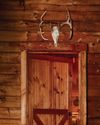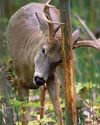How to Wield, sharpen, maintain, and survive by the outdoors-Man's ultimate tool.

Carve a Jaw Spear
Pacific Northwest natives devised salmon spears with sinew and bone that were brawny enough to hoist kings and silvers from roiling rapids. You can channel your inner Suquamish with this survival spear capable of snagging frogs, fish, and small rodents. All you need is a sharp knife and a bit of parachute cord. A bone from your last squirrel dinner isn’t required, but it will make for a beefier—and more savage—spear.
Step 1
Cut a 2-foot length of p-cord and tease out the inner core strands. They’re a perfect twine for lashing.
Step 2
Cut a straight, green sapling of hardwood, such as hickory or maple, 1 foot longer than your height and with a strong fork on one end. Remove the bark from the forked tines. Trim the ends of the forks so each is 4 to 5 inches long, and angle each fork tip slightly by removing a few slivers of wood from the inside of the tip.
Step 3
For a center spike, carve a 2-inchlong sharp stick—or better yet, a sharp spike of bone—and lash it to the inside of the fork. Start with a clove hitch about a half inch below the fork, and wrap the windings tightly toward the fork. When the lashing reaches the fork, continue by making a few more wraps to create a pocket for the butt of the spike. Place the spike in this pocket, then continue lashing by alternating the cord under and over the spike, tightening with each lash. Secure the lashing.
Step 4
Diese Geschichte stammt aus der April - May 2018-Ausgabe von Field & Stream.
Starten Sie Ihre 7-tägige kostenlose Testversion von Magzter GOLD, um auf Tausende kuratierte Premium-Storys sowie über 8.000 Zeitschriften und Zeitungen zuzugreifen.
Bereits Abonnent ? Anmelden
Diese Geschichte stammt aus der April - May 2018-Ausgabe von Field & Stream.
Starten Sie Ihre 7-tägige kostenlose Testversion von Magzter GOLD, um auf Tausende kuratierte Premium-Storys sowie über 8.000 Zeitschriften und Zeitungen zuzugreifen.
Bereits Abonnent? Anmelden
LIVING THE DREAM
After the author arrives in Maine’s fabled North Woods with a moose tag in his pocket, an adventure he’s been wanting to take his entire hunting life, reality sets in, and he learns a valuable lesson: Be careful what you wish for
Get the Drift
How to make an accurate windage call under pressure

First Sit
An icebreaker outing in a pristine spot produces the rut hunt of a lifetime
A Local Haunt
The author finds a sense of place in an overlooked creek, close to home

A Hop and a Pump
Jump-shooting rabbits with classic upland guns is about as good a time as you can have in the outdoors

Welcome TO camp
Is there any place better than a good hunting camp? It has everything: great food, games and pranks, and of course, hunting. Shoot, we don’t even mind going to camp for grueling work days in the summer. Here, our contributors share their favorite stories, traditions, and lessons learned from camps they’ve shared. So come on in and join us. The door’s open.
THE DEERSLAYERS
Before you even claim a bunk, you need to eyeball the hardware your buddies have brought. In the process, you’ll see that the guns at deer camp are changing. What was walnut and blued steel may now be Kevlar and carbon fiber. The 10 rifles featured here aren’t your father’s deer guns. They’re today’s new camp classics
THE JOURNEY TO PIKE'S PEAK
Last summer, the author and three friends ventured off the grid to a remote fish camp in Canada. They hoped for great fishing, but what they experienced was truly something else

Stage Directions
When early-season whitetails vanish from open feeding areas, follow this woods-edge ambush plan
Rookie Season
A pup’s first year, from preseason training to fall’s big show